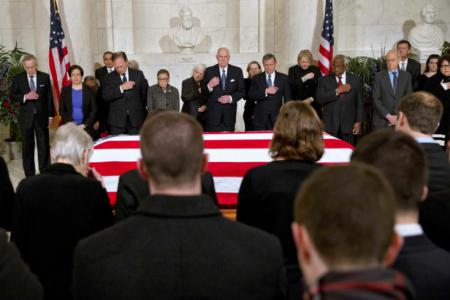Justice Antonin Scalia returns to dust -- and hopefully to heaven
Justice Antonin Scalia (1936-2016), who was appointed to the U.S. Supreme Court by President Reagan in 1986, and confirmed unanimously at the time by the U.S. Senate -- an amazing fact, given subsequent developments -- served for almost 30 years as the conservative anchor of the court. He was brilliant, combative and humorous: an eloquent proponent of originalism, the view that the Constitution should be interpreted as it was understood when it was enacted. He viewed the idea of the "living Constitution" as an invitation for judges to substitute their shifting personal or ideological views for democratically-enacted legislation. He advocated reading statutes the way they were written, textually, rather than cherry-picking "legislative history" from statements made by legislators.
A larger-than-life personality, he was a devout Catholic who loved the Mass in Latin. His funeral Mass at the Basilica of the National Shrine of the Immaculate Conception in Washington, D.C., was celebrated by his son, Father Paul D. Scalia, a priest of the Diocese of Arlington, Va. Eschewing eulogizing from the pulpit, his son's homily struck the perfect tone. After giving thanks for those in attendance on behalf of his family, he began: "We are gathered here because of one man. A man known personally to many of us, known only by reputation to even more. A man loved by many, scorned by others. A man known for great controversy, and great compassion. That man, of course, is Jesus of Nazareth."
The homily, being about Jesus Christ yesterday, today and forever, and about the Church he founded that Justice Scalia was nurtured in, also eschewed politics. The only mild reference was when he said, "God blessed Dad, as is well known, with a love for his country. He knew well what a close-run thing the founding of our nation was. And he saw in that founding, as did the founders themselves, a blessing, a blessing quickly lost when faith is banned from the public square, or when we refuse to bring it there."
The priest son recalled the time he was scolded by his father after hearing confessions. "The issue that evening was not that I had been hearing confessions, but that he had found himself in my confessional line, and he quickly departed it. As he put it later, 'Like heck if I'm confessing to you!' The feeling was mutual."
Towards the end of his homily, Father Scalia said, "He was a practicing Catholic, 'practicing' in the sense that he hadn't perfected it yet. Or rather, Christ was not yet perfected in him. And only those in whom Christ is brought to perfection can enter heaven. We are here, then, to lend our prayers to that perfecting, to that final work of God's grace, in freeing Dad from every encumbrance of sin. But don't take my word for it. Dad himself, not surprisingly, had something to say on the matter. Writing years ago to a Presbyterian minister whose funeral service he admired, he summarized quite nicely the pitfalls of funerals and why he didn't like eulogies. He wrote: 'Even when the deceased was an admirable person, indeed especially when the deceased was an admirable person, praise for his virtues can cause us to forget that we are praying for and giving thanks for God's inexplicable mercy to a sinner.' Now he would not have exempted himself from that. We are here then, as he would want, to pray for God's inexplicable mercy to a sinner."
In this season of Lent, we are reminded that all of us come from dust, and eventually return to dust. But because of Jesus' death and glorious Resurrection, we hope that our dust will become stardust, and that we will be gloriously united with Jesus and the saints in heaven, and reunited with our families and loved ones. May he rest in peace. Amen.
DWIGHT G. DUNCAN IS A PROFESSOR OF CONSTITUTIONAL LAW AT UMASS SCHOOL OF LAW DARTMOUTH.
- Dwight G. Duncan is professor at UMass School of Law Dartmouth. He holds degrees in both civil and canon law.



















